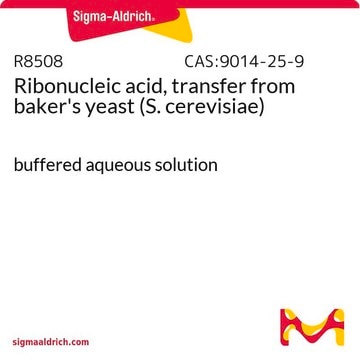10108626001
Roche
Poly(A)
lyophilized, suitable for PCR, pkg of 100 mg
Sinónimos:
Poly(A), Polyadenylic acid
About This Item
Productos recomendados
descripción
Polyadenylic acid
Nivel de calidad
formulario
lyophilized
mol peso
700-3500 kDa
envase
pkg of 100 mg
fabricante / nombre comercial
Roche
concentración
0.5 mg/mL (Working concentration)
técnicas
PCR: suitable
color
white
solubilidad
water: soluble
cociente de absorbancia
A290/260 nm 0.03-0.05
A280/260 nm 0.28-0.32
A250/260 nm 0.86-0.90
temp. de almacenamiento
2-8°C
Categorías relacionadas
Descripción general
Aplicación
Acciones bioquímicas o fisiológicas
Calidad
2.3μmol/mg Poly(A) (from absorbance) in relation to one mononucleotide unit. Chromatographically homogeneous.
Absorbance determination A250/A260, A280/A260, A290/A260
Secuencia
Definición de unidad
Forma física
Nota de preparación
A concentration of 0.5 mg/ml is recommended.
Working solution: 0.5 mg/ml is recommended.
Otras notas
Código de clase de almacenamiento
11 - Combustible Solids
Clase de riesgo para el agua (WGK)
WGK 1
Punto de inflamabilidad (°F)
Not applicable
Punto de inflamabilidad (°C)
Not applicable
Certificados de análisis (COA)
Busque Certificados de análisis (COA) introduciendo el número de lote del producto. Los números de lote se encuentran en la etiqueta del producto después de las palabras «Lot» o «Batch»
¿Ya tiene este producto?
Encuentre la documentación para los productos que ha comprado recientemente en la Biblioteca de documentos.
Nuestro equipo de científicos tiene experiencia en todas las áreas de investigación: Ciencias de la vida, Ciencia de los materiales, Síntesis química, Cromatografía, Analítica y muchas otras.
Póngase en contacto con el Servicio técnico








